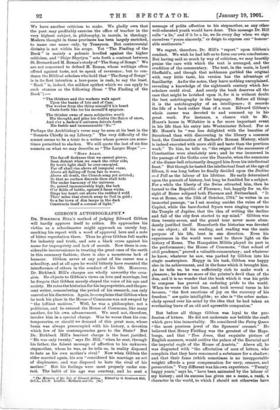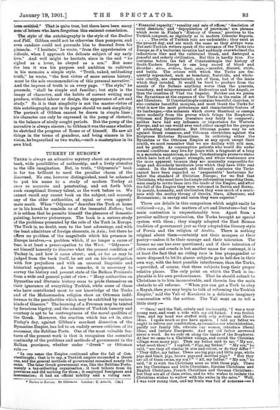GIBBON'S AUTOBIOGRAPHY.*
DR. BIB,KBECK HILL's method of judging Edward Gibbon will hardly approve itself to critics. He approaches his victim as a schoolmaster might approach an unruly boy, marking his report with a word of approval here and a note of bitter reprobation there. Thus he gives Gibbon full marks for industry and truth, and sets a black cross against his name for impropriety and lack of morals. Now there is con- siderable inconvenience in treating the great ones of the earth in this summary fashion; there is also a monstrous lack of humour. Gibbon never at any point of his career was a schoolboy, and at all ages he would bitterly have resented the interference of others in the conduct of his life. Moreover, Dr. Birkbeck Hill's charges are wholly unworthy the occa- sion. He objects to Gibbon's views on love and marriage, but he forgets that Gibbon merely obeyed the voice of his age and society. He rates the historian for his improprieties, and the pre- sent writer, remembering the period of his research, can only marvel at his discretion. Again, he complains that Gibbon when he took his place in the House of Commons was not swayed by "the loftiest motives." Well, he was a philosopher, not a politician, and he entered the House of Commons, like many another, for his own advancement. We need not, therefore, involve him in a special charge. Was he worse than his con- temporaries, or should we demand of this great man, whose brain was always preoccupied with his history, a devotion which few of his contemporaries gave to the State? But Dr. Birkbeck Hill's heaviest charge is the least justified. "He was only twenty," says Dr. Hill, "when he sent, through his father, the falsest message of affection to his unknown stepmother, whom he was, as he tells us, in reality disposed to hate as his own mother's rival." Now when Gibbon the elder married again, his son "considered his marriage an act of displeasure, and was disposed to hate the rival of his mother." But his feelings were most properly under con- troL The habit of his age was courtesy, and he sent a • Tito Memoirs of t.J14 Lift, of Edward. (labor.. Edited by G. Birkbeek Hill, D.C.L. LL.D. London Methuen and Co. [GI]
message of polite affection to his stepmother, as any other well-educated youth would have done. This message Dr. Hill calls " a lie," and if it be a lie, we lie every day when we sign ourselves "yours sincerely," or deign to express our "honour- able sentiments."
We regret, therefore, Dr. Hill's "report" upon Gibbon's conduct. We wish he had left us to form our own conclusions. But having said so much by way of criticism, we may heartily praise the care with which the text is arranged, and the erudition of the commentary. The text, in the main, is Lord Sheffield's, and though that nobleman garbled the original with very little taste, his version has the advantage of familiarity. As for the notes, they leave nothing unexplained, revealing a knowledge of the eighteenth century which few scholars could rival. And surely the book deserves all the care that might be lavished upon it, for it is without doubt the best autobiography in the language. Before all things it is the autobiography of an intelligence ; it records the life of a book rather than of a man. Edward Gibbon's whole career was devoted to and summed up in his great work. For instance, a chance visit to Mr. Hoare's house in Wiltshire is a far more important event in his life than his entry into Westminster School. For at Mr. Hoare's he "was less delighted with the beauties of Stourhead than with discovering in the library a common book, the Continuation of Eachard's Roman History, which is indeed executed with more skill and taste than the previous work." To him, he tells us, "the reigns of the successors of Constantine were absolutely new; and he was immersed in the passage of the Goths over the Danube, when the summons of the dinner-bell reluctantly dragged him from his intellectual feast." But though he tasted the intellectual feast at the age of fifteen, it was long before he finally decided upon the Decline ar,cl Fall as the labour of his lifetime. He early determined upon the pursuit of history, but long he fumbled for a subject. For a while the liberty of the Swiss attracted him, then he turned to the Republic of Florence ; but, happily for us, the sight of Rome eclipsed both Florence and Switzerland. "It was at Rome, on the 15th of October, 1764," he writes in an immortal passage, "as I sat musing amidst the ruins of the Capitol, while the bare-footed fryars were singing vespers in the Temple of Jupiter, that the idea of writing the decline and fall of the city first started to my mind." Gibbon was then twenty-seven, and the grand tour never more abun- dantly justified itself. Henceforth the historian was devoted to one object ; all his reading, and reading was the main purpose of his life, bent in one direction. Even his experiences in the world were used to throw light on the history of Rome. The Hampshire Militia played its part in the performance ; the House of Commons, "that school of civil prudence," proved a valuable commentary ; and whatever he knew, whatever he saw, was packed by Gibbon into his single masterpiece. Happy in his task, Gibbon was happy also in its achievement, and in the fame which it brought him. As he tells us, he was sufficiently rich to make work a pleasure ; he knew no more of the printer's devil than of the dun, and it is no wonder that the book which it was his pride to compose has proved an enduring pride to the world. When he wrote the last lines, and took several turns in his berceau, "the first emotions of joy on the recovery of his freedom" are quite intelligible ; so also is "the sober melan- choly spread over his mind by the idea that he had taken an everlasting leave of an old and agreeable companion."
But before all things Gibbon was loyal to the pro- fession of letters. He did not underrate nor belittle the craft which gave him immortality. He considered the Fairy Queen the most precious jewel of the Spensers' coronet." He believed that Henry Fielding was the greatest of the Haps- burgs, and that "Tom Tones, that exquisite picture of English manners, would outlive the palace of the Escurial and the imperial eagle of the House of Austria." Above all, he was disgusted with "the affectation of men of letters, who complain that they have renounced a substance for a shadow; and that their fame (which sometimes is no insupportable weight) affords a poor compensation for envy, censure, and persecution." Very different was his own experience. "Twenty happy years," says he, "have been animated by the labour of my history; and its success has given me a name, a rank, a character in the world, to which I should not otherwise lutilt be entitled." That is quite true, but there have been many ma of letters. who. have forgotten_ this eminent consolation.
The style of the autobiography is the style of the Decline and YalL Gibbon could not be otherwise than pompous, and even candour could not persuade him to descend from his pinnacle. "I hesitate," he wrote, "from the apprehension of ridicule, when I approach the delicate subject of my early love." And well might he hesitate, since in the end "he sighed as a lover, he obeyed as a son." But none the less it was his purpose and ambition to cultivate in his memoirs a simple style. "Truth, naked, unblushing truth," he wrote, "the first virtue of more serious history, must be the sole recommendation of this personal narrative." And the impress of truth is on every page. "The style," he proceeds, "shall be simple and familiar; but style is the image- of character, and the habits of correct writing may produce, without labour or design, the appearance of art and study." So it is that simplicity is not the master-virtue of this autobiography, nor in its pages should we seek simplicity. The portrait of Gibbon cannot be drawn in simple lines ; his character can only be expressed in the pomp of rhetoric, in the balance of nicely sought periods. But the pomp of the narrative is always sincere; to Gibbon it was the same whether he sketched the progress of Rome or of himself. He saw all things in the terms of grandeur, and being sincere in his vision, he bequeathed us two works,—each a. masterpiecein its own kind.







































 Previous page
Previous page